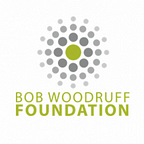So, You’d Like to Submit a Grant Proposal?
Here Are a Few Things to Consider
By Samuel Holmes, Charitable Investments Program Officer
My supervisor, Dr. Meg Harrell, recently presented to a group of nonprofit professionals, all of whom serve veterans and their caregivers, during the Elizabeth Dole Foundation’s Impact Forum series of collaborative phone calls.
The purpose of her talk was to demystify our grant making process; to pull back the screen on a set of standards that the Bob Woodruff Foundation believes in, and that I have worked hard to live up to.
As a Charitable Investments Program Officer, I research and analyze trends strategically to identify gaps and needs in the post-9/11 military connected community. All programs that we fund must satisfy our due diligence process by demonstrating sufficient expertise, qualified management, and financial responsibility.
I expect a lot of the programs I partner with. They must share my passion for collaboration and responsible stewardship. Given the wide range of programs in our portfolio, I cannot possibly be an expert on every issue in the population we serve.
Therefore, I put a lot of stock in what is presented to me by potential grantees. Presentation, professionalism, and evident expertise are vital characteristics for competitive applicants. Applicants must present information in a clear way that states the goals and outcomes of a given program.
My point of contact needs to be able to articulate all facets of their program and answer questions on all aspects of the proposal. And, the program must be supported by evidence and monitored through exhaustive evaluation of data.
I am paid to be skeptical and thorough. If I write a check to every organization that comes across my desk, I would be doing a disservice to our funders and the population we serve.
Every dollar spent is a precious resource. Therefore, I must ensure that programs are addressing needs in our population, have an understanding of how they fit into the landscape of the community, work collaboratively across the space, and meet the mission and vision of our founders. That way, I can ensure that these services optimally serve those who need them most.
What I do, and vow to continue doing, is evaluate programs objectively and conduct my business honestly. I hold programs to a high standard and expect them to welcome every challenge I present.
I promise this, not only because that is the Bob Woodruff Foundation standard, but most importantly because I want the best for post-9/11 veterans, service members, their families, and caregivers.
For me, this work is personal. I served in the Marine Corps, from 2006–11, and deployed to Iraq and Afghanistan. I had the privilege of being an NCO—leading junior Marines. One of the hardest decisions I ever made was leaving the military.
The transition to civilian life was not always easy. I felt alone in the world until I enrolled in college and quickly found a veterans community on campus. With the help of my newfound community and local veteran serving organizations, I completed my bachelor’s degree.
Fortunately, upon entering the workforce I found my way to the Bob Woodruff Foundation—an organization that meets the standards of accountability and mission focus that this space needs.
As we open our first 2018 grant cycle, I am excited about what the veterans space has accomplished and hopeful of what is to come. I welcome all organizations that share our vision to send the Bob Woodruff Foundation a proposal summary. The proposal period is open now, through Jan. 10, 2018. We strongly encourage those who wish to apply to do so early—well before the application period closes—to start a meaningful conversation about your program.
Please visit our Grants Page for more information on our Charitable Investments program and submission guidelines.
Related articles:
